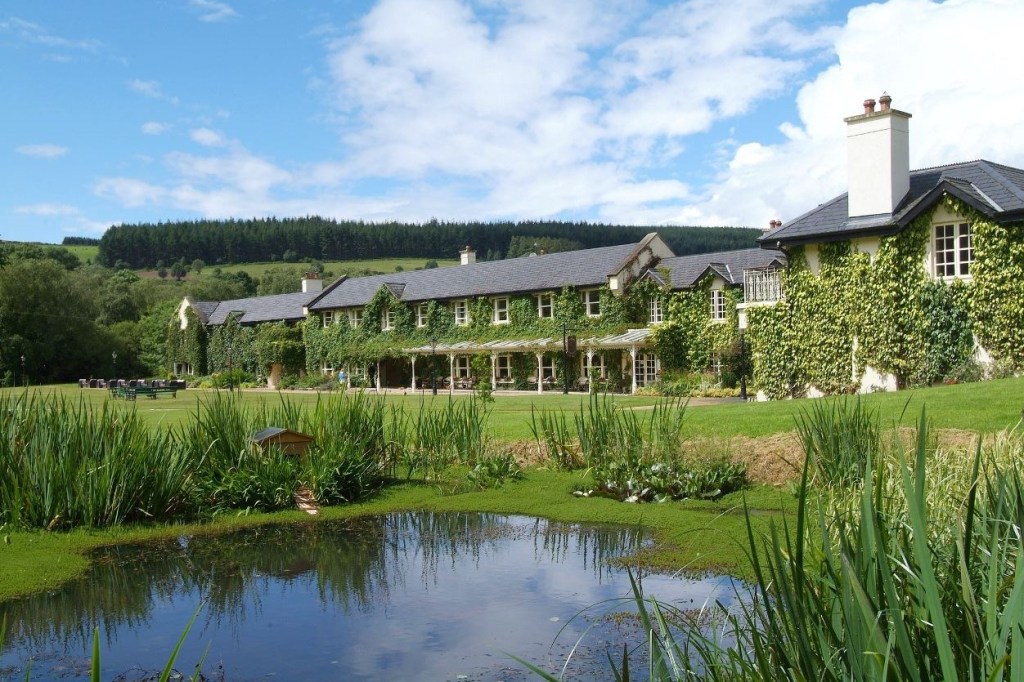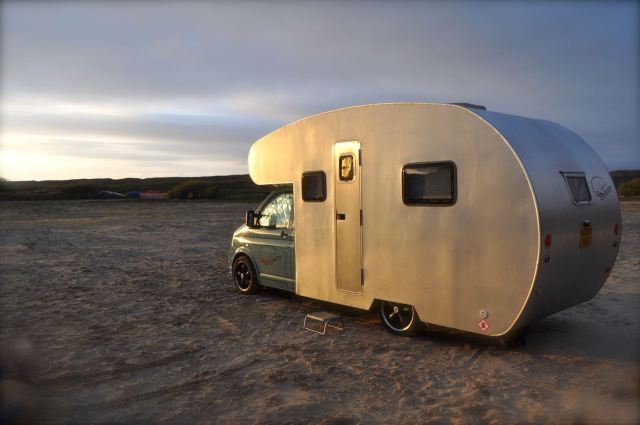
This post was initially written when almost all of Ireland was holed up indoors thanks to an East Siberian wind called the ‘Beast from the East’. During those 4 days of confinement I spent hours travelling the internet highways, clearing digital to-do’s and lining up future article. Going by the amount of Whatsapp, Facebook and Instagram content generated I wasn’t the only one. Here is one such article born out of my days of respite thanks to the ‘Beast from the East’.
Nothing mentioned in this article has been sponsored. It’s all just my own personal opinion. If you like your sources to remain independent then please;
share this article, or
buy me a coffee on Ko-fi, or
make a one-time donation via Paypal
Sustainable Accommodation in Ireland
Here’s a listing of places I’ve found on my internet travels, and ones that I felt were walking the walk and not just talking the talk with intentions and vague promises. I’ve organised it by county for handiness. If you don’t find anywhere to suit your needs there are a few more places on these websites;
- Ecobnb is an online listing of a wide range of environmentally friendly accommodation from hotels to organic farms
- Nature.house does exactly what it says on the tin; let you find a house in the middle of nature, and for every night booked they’ll plant a tree.

Carlow
Blackstairs Eco Trails in Carlow offer accommodation in these really cute Shepherds huts for two to compliment the eco workshops, walks and foraging days that they run. They provide organic and wild food, keep their own hens and have their own wood.
Cavan
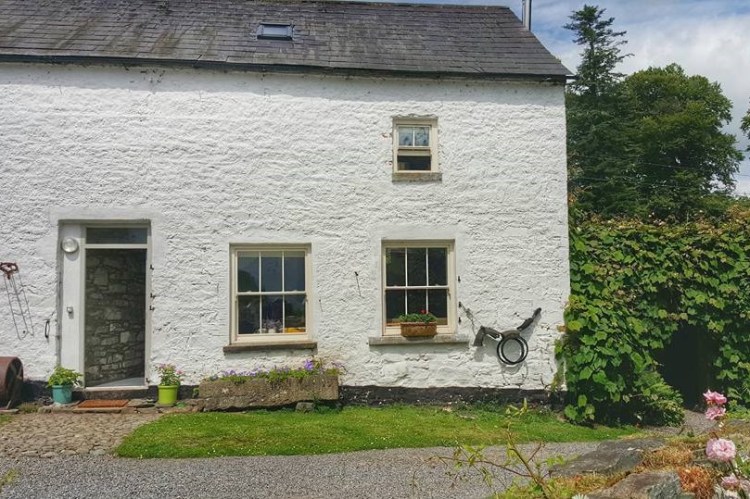
Lakeview Organic Farm in Mullagh, Co Cavan, offer a double ensuite bedroom and art studio to let complete with open plan living and kitchen area with a wood burning stove (wood & turf supplied).
Clare
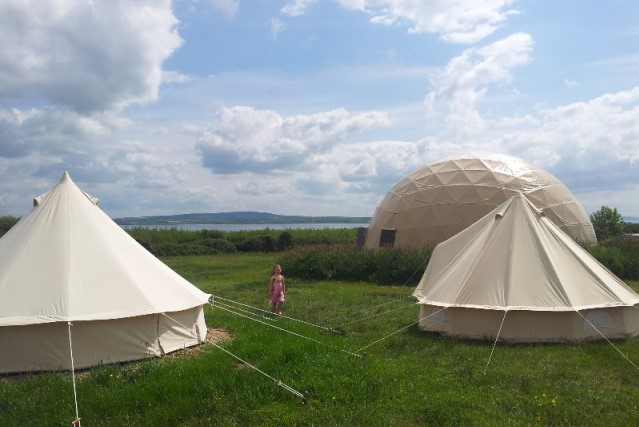
At the eco-campsite Pure Camping, in Querrin, Loop Head, Co Clare you can pitch your own tent or hire one of their generously sized bell-tents that fit up to 4 people, some of which come with wood burning stoves. If you don’t feel like camping you can also rent one of the three off-grid wooden cabins with stoves (for 4-6 people), or one of two self-contained wooden lodges with electricity (for 5-6 people). They compost all food waste and provide solar-heated showers and marine (water-efficient) showers heated by a log-burning stove. They only burn FSC certified logs and use rain water harvesting systems and solar-powered lights as much as possible. This campsite is run by a friend of mine and we’ve stayed in it a couple of times. I love the laid-back atmosphere and meeting like-minded people there. You can read about our sustainable holiday in Clare in 2016 here.

Hotel Doolin in Doolin, Clare is the first certified Carbon Neutral hotel in Ireland. It also won Best Medium Sized Organisation 2018 & 2022 at the Green Awards. They harvest their own rainwater, grown their own vegetables and herbs for use in their restaurants, make their own compost, buy 70% of their food produce from local suppliers (within a 30 mile radius), use organic bath & soap products in their rooms from local company Voya range, have charging points for electric cars, continually reduce food waste (28% since 2019), and water waste (59% per guest since 2017), don’t sell any plastic bottles of soft drinks or water, offer reusable glasses for attendees to their festivals, have banned disposable cups for staff, offer discounts to customers with reusable cups and give a free tea/coffee and a 10% discount to guests arriving by bike, encourage carpooling to their festival, have reusable Do Not Disturb Signs, use digital invites and reusable signs to avoid printing, sell only local crafts in their giftshop, promote sustainable transport options to their guests, give vouchers to guests that forgo room servicing, only use fairtrade coffee and recycled toilet paper. They have reduced their oil consumption by 68% since 2018. The heating system in the hotel is an ambient air-to-water system run on green electricity, and they upcycle as much as possible with lots of items around the hotel made from salvaged materials. The barn that they use for functions is passively heated, i.e. doesn’t require fossil fuel to heat or cool. As well as being active members of local businesses they plant 2,700 native Irish trees locally at Moyhill Community Gardens and have raised circa €80,000 in the last 4 years for several charities. They also litter pick local hedgerows and the local village.
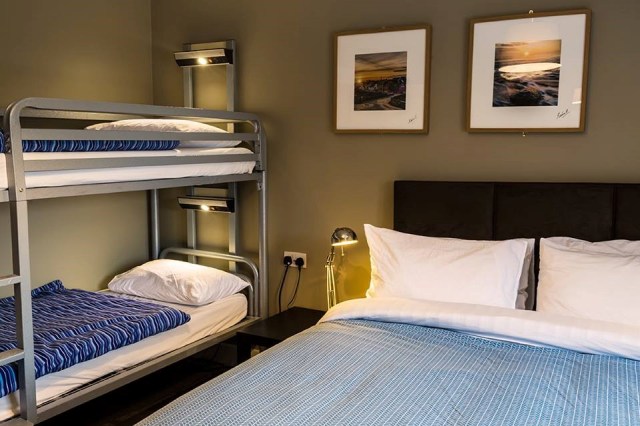
Doolin Hostel in Doolin, Co Clare have successfully managed to reduce their energy consumption by 23% and water consumption by 60% despite having more guests and adding a cafe. All of their waste-water is treated in a natural puraflo peat treatment plant. They also support public transport options by selling bus tickets and All their duvets and pillows are eco-certified. They’ve employed local carpenters to make our bed-heads and some furniture using wood from sustainable forests, all their flooring in their bedrooms is from sustainable forests and they reclaim, reuse and find new uses for old furniture and products where possible. They sell local produce in their cafe and get some fruit a veg from the owner’s father’s garden next door.
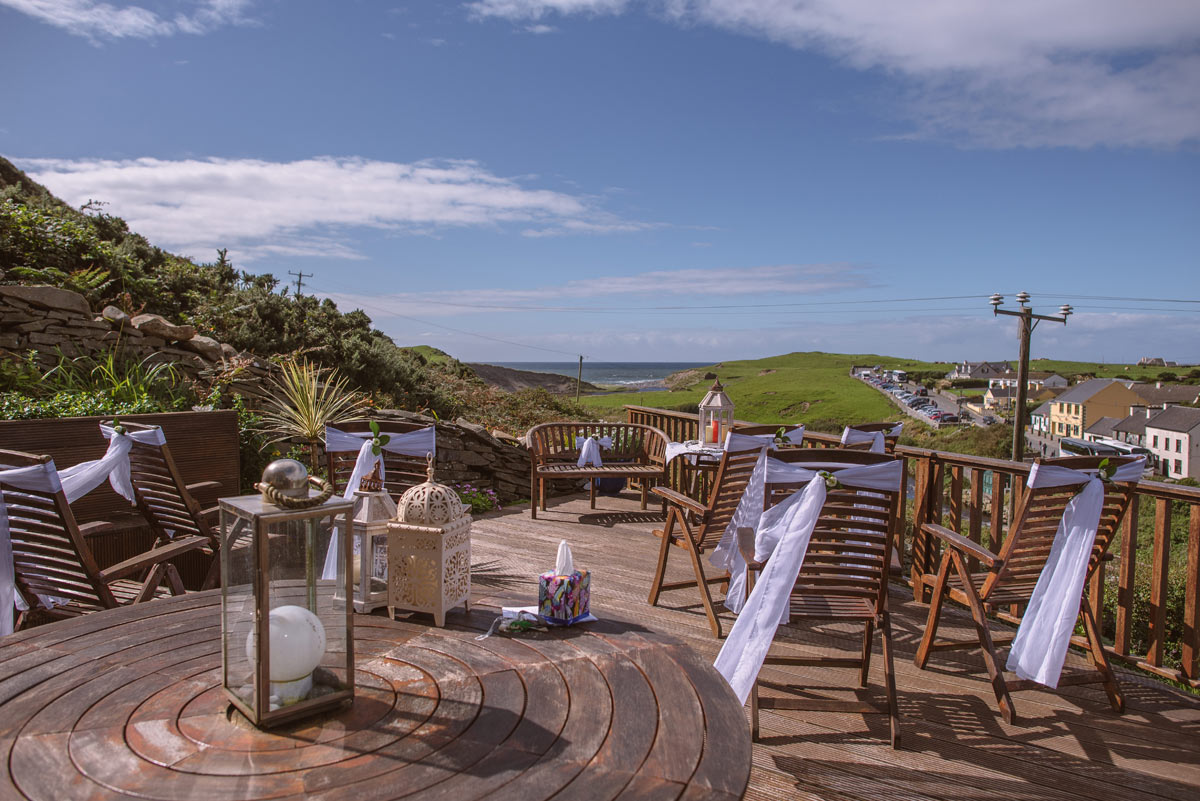
On it’s website the Seaview House in Doolin, Co Clare gives a very detailed account of how it reduced it’s water and energy usage to below the target figures outlined European Commission Joint Research Centre (2013) . They have three lodges that can host 4-8 people and one house that can host up to 10 people. They use solar panels to provide electricity, solar collectors for hot water and propane from renewable feedstocks (BIO LPG) for heating. They also use their food waste either as chicken feed or as compost for their garden, supply some of their fruit and veg from their own farm, bake a lot of the goods they serve, make chutneys from their own produce and source food locally. Finally, they offer solar car charging stations for guests.

Gregans Castle Hotel in Ballyaughan, Co Clare installed a pv solar system that generates 32% of their daytime electricity and a heatpump that services 3 bedrooms. Their heating comes mainly from renewable propane (BIO LPG) and the rest of the electricity needed comes from a company that invest in renewables in Ireland. They also compost all food and paper waste, use their own compost on their chemical-free garden of native shrubs and plants, grow their own herbs and most of their own vegetables, plant trees on their land and use timber trimmed from their own trees for firewood, serve their own spring water in reusable bottles, use an onsite natural reed and willow bed treatment system to purify all wastewater generated by the hotel, carry out a cleanup of litter, purchase local food, use natural fabrics and natural pigment paint when decorating, use eco toiletries, have charge points for electric cars, bikes for guests and operate Leave no Trace tours.
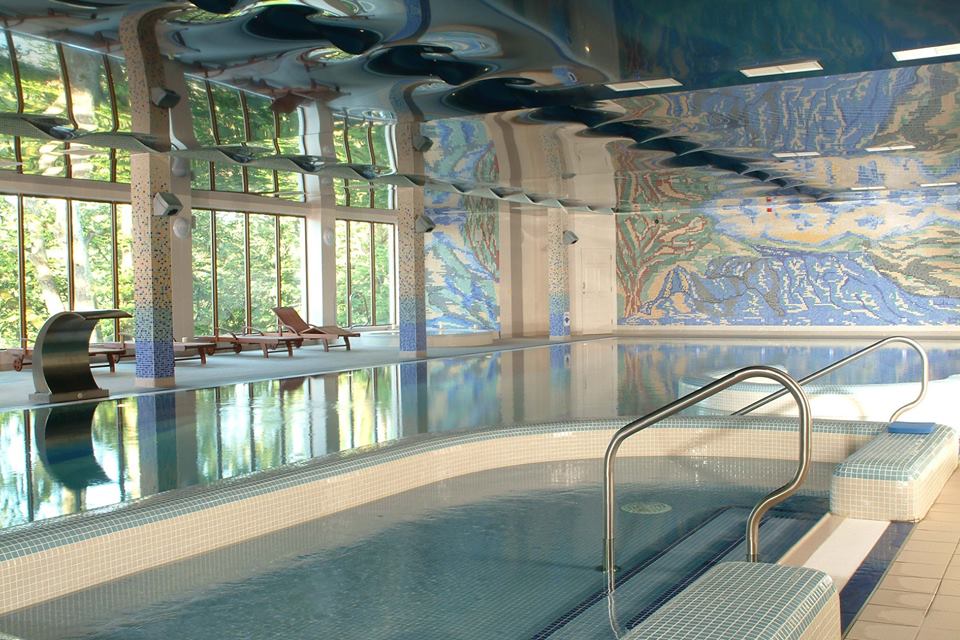
Thanks to a hydro turbine that the hotel installed in an adjacent river the Falls Hotel and Spa in Ennistymon, Co Clare gets all its electricity from water when the river is full. They also use eco cleaning products, aerators on taps, energy efficient lighting, sensors to reduce energy usage. They don’t use plastic straws, cups, bottles or take-away containers and have a wildflower meadow, electric car charging points, bikes available for and are members of the Burren Ecotourism Network. They also monitor water, food waste & chemical usage on site and set targets for reducing each of them annually. The venue has received an Ecolabel from the green hospitality consultancy organisation, Green Hospitality Ireland and in March 2021 was certified as carbon neutral venue by the same organisation. According to the hotel website the venue has managed to reduce its carbon emissions by 90% over 5 years, with the remaining 10% offset through the planting of 350 saplings of native Irish trees on the property.

The Wild Honey Inn in Lisdoonvarna have offers several rooms that accommodate two adults on the grounds of their ‘chemical-free’ garden with native flowers and shrubs complete with birdfeeders and bug boxes. They also source local, free-range and organic goods in their Michelin Star pub where possible. They use toiletries that are free from parabens, phthalates and artificial colours, and come in a paper container. They money raised from buying these toiletries going towards sustainable pollination research.

Clare Eco Lodge at Loughnane’s in Feakle comprises of 100-year-old historical buildings refurbished in 2018. They generate 60% of electricity on site using solar panels and they grow their own vegetables and herbs.

Burren Glamping offer accommodation for up to 6 people in a one-roomed converted horse box with a wood stove, based on an eco-friendly and sustainable farm where no synthetic chemicals are used and animals are raised with lots of space and care. Fruit and veg is grown on site
Cork
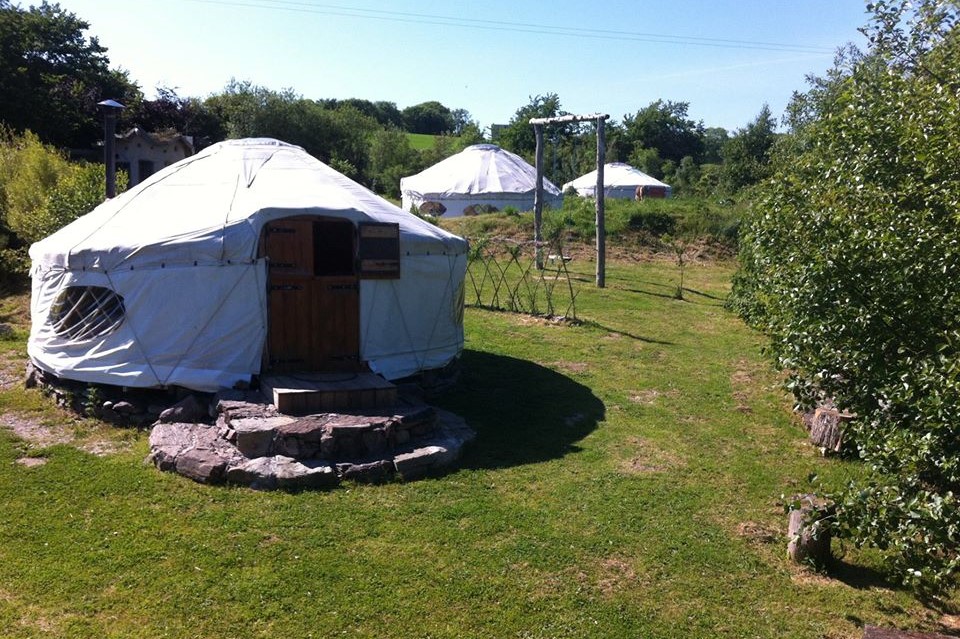
Inch Hideaway is billed as a sustainable camp site situated walking distance from Inch Beach, Co Cork, although no specific information how it is sustainable was available on their website. The accommodation on offer includes 5 luxury yurts (5-6 people) and the Wanderly Wagon that sleep up to 4 people. Each yurt sits on raised platforms and is heated with a wood fired stove and furnished with beds. There is a communal kitchen, banquet dining area, BBQs, wood fired pizza oven and campfire pit. They also offer coastal foraging walks for a fee.
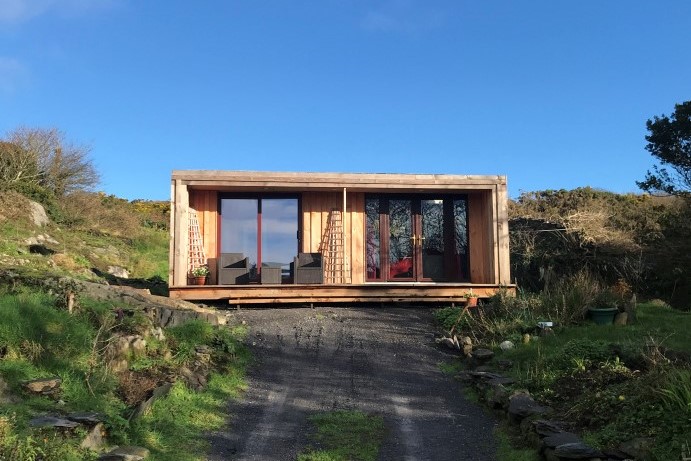
Goleen Harbour in West Cork offers tent and campervan pitch areas, tents (for 2-6 people), tiny cabins (for 4-5 people) and a geodome with two bedrooms that can that can fit up to 4 people. The array is set on land that is partially a farm producing veg and honey organically, partially native woodland and partially Special Area of Conservation (SAC) which they graze with Connemara ponies. They have bike rental on site and a small farm shop with homegrown organic veg. The family that run the farm and accommodation have been heavily involved in the development of sustainable tourism in Ireland and have constructed their cabins using as much local materials as possible.

Ark Ranch Treehouse in Macroom, Co Cork, is a 2 person treehouse built using locally sourced or reclaimed materials, set on an organic farm with friendly donkeys, horses and dogs.
Another property in Cork, the Mallow Hibernian Hotel has converted it’s indoor pool to a rainwater pool, which uses 70-90% less chlorine. For some reason they don’t mention this on their website but you can read about it in this article by Echolive.ie
Down
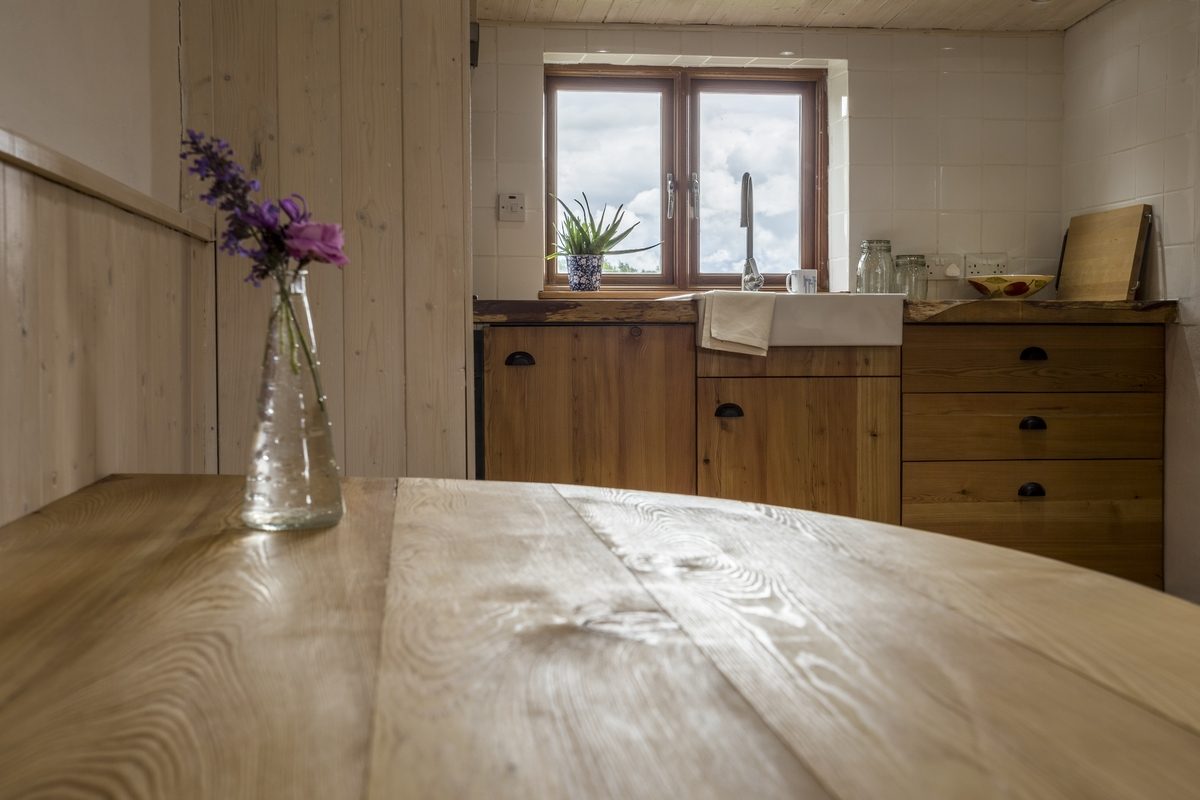
Birche Cottage in County Down was awarded Gold by Green Tourism. The cottage, which accommodates two, is carbon neutral. Electricity in the cottage is generated from solar and wind energy. Hot water and underfloor heating is heated by way of a solar panel. They offset their carbon footprint by planting trees in their farm. The owners state that the interior has been restored with local, chemical-free, reclaimed materials and that organic produce is available to buy from the owners during your stay. They also have a quirky off-grid 2-person horse box to stay in too.
Donegal

Breac House is a modern bed and breakfast furnished with contemporary Irish furniture and decorations on Horn Head, Donegal, a Special Area of Conservation (SAC) under the EU Habitats Directive. The house is an adult only retreat with rooms accommodating 1-2 adults. It is heated by two air source heat pumps and their sauna is off-grid, using no electricity. They’ve also installed a rainwater harvesting system which supplies all their toilets, and provide electric charging facilities and bike helmets to guests free of charge. They make their own breads, pastries, butter, and yoghurt using local organic ingredients – some of which are grown on site, others are from local growers. They compost as much food and garden waste on site as possible and use environmentally friendly guest toiletries, cleaning and garden products. They are members of Sustainable Tourism Ireland, Leave no Trace and other affiliations who are committed to sustainable travel practices.

Lough Mardal Glamping offers yurts, shepherds huts and a stunning communal building called the lodge. The lodge is constructed almost exclusively with natural materials including; locally sourced timber, straw-bale for external walls and cob (mud, straw and water) for internal walls. The lodge also has a ‘living’ green roof complete with grasses and wildflowers excavated from the earth around it. Up to 2 adults and 2 children can stay in the off-grid yurts – some of which are pet friendly – and avail of the lodge’s amenities. Their yurt platforms were built using recycled tyres and the wooden flooring is upcycled old wedding marquee flooring. Their heating and hot water is by way of an air-to-water heat pump. They purchase renewable energy, and an EV charge point is available on site. Motion sensors are use to minimise energy consumption, along with energy efficient appliances. They use a natural reed-bed and wetland system to process sewage. 9000 native broadleaf trees have been planted on site. Guests are discouraged from bringing plastic packaging on site and refills of fresh well water is available to guests. Compostable waste is used to feed the organic vegetable garden on site. They source food locally and prioritise organic. They buy as much organic, biodegradable, cruelty-free and Irish sourced products as possible with guest toiletries being by The Handmade Soap Co. an Irish company and cleaning products being by Lillys & Bio D, bought in bulk refill containers.
Dublin
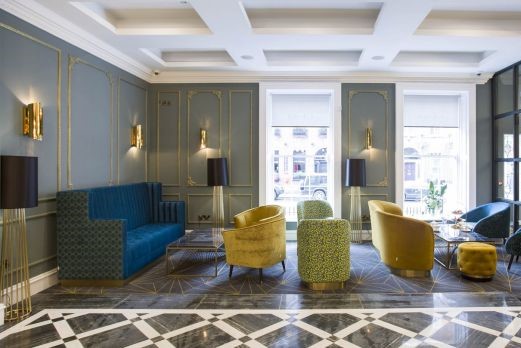
The Iveagh Garden hotel on Harcourt St, Dublin 2 is billed as ‘Europe’s First Sustainable Hotel’ and sources all of its energy from an underground river, running 50 metres below the hotel, via large turbines.

The Wren Urban Nest in Dublin 2 is a BER A rated hotel. It runs on renewable energy and have installed a highly-efficient heating and ventilation system. They offer free filtered water on every floor to help guests avoid single-use plastic. Their restaurant prioritises local, seasonal organic food whenever possible, and runs a zero-waste kitchen. They have a rooftop garden to support bees and other insects needing refuge in the city. They use upcycled, recycled and biodegradable materials and products throughout the hotel and they avoid single-use plastics.
You can also book rooms in Trinity College over the summer, which would otherwise lie vacant without students until college term starts.
Galway
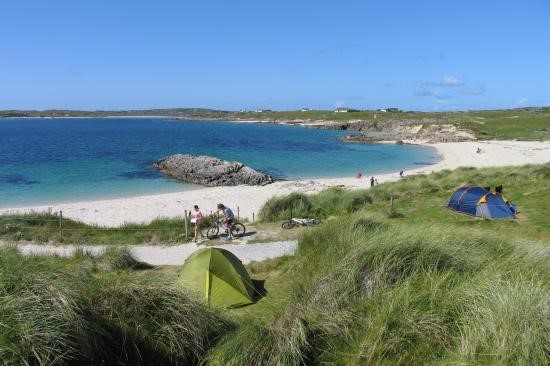
Clifden Eco Campsite in Co Galway is a low density campsite on the shores of Streamstown Bay. The park co-exists alongside an organic farm, which was the first to be certified as this in Connemara. In 2014 they achieved a Gold standard eco tourism award from EcoTourism Ireland and in 2015 they achieved ‘climate neutral status’ from myclimate, making them the first ‘climate neutral’ accommodation in Ireland.
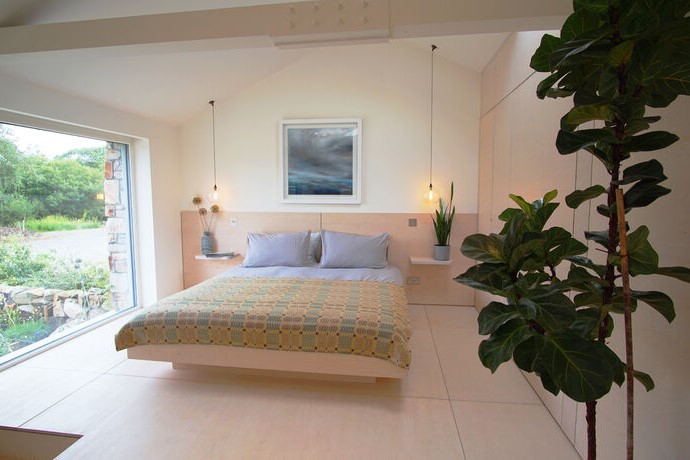
Also in Cliften, Ferwood Eco offers accommodation for couples on it’s organic farm, on which they planted 300 native trees in 2021.
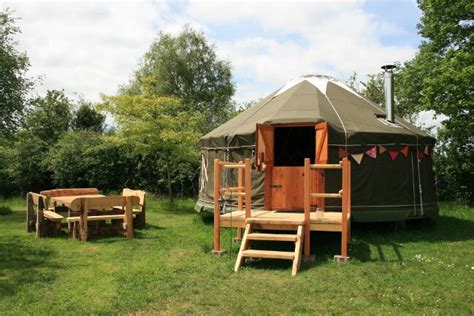
Based on an organic farm, Crag Og Eco Farm in Galway is a certified Gold standard Ecotourism provider focused on instilling conservation in its guests. They have a waste-minimisation strategy, which involves reducing waste as much as possible with whats left being recycled or composted. Many of the structures at the site are made from recycled pallets and other recycled materials and plenty of details on their sustainable practices and policies can be viewed on their website.

Dolphin Hotel on Innisbofin island, off the Galway coast was designed to utilise heat and light from the sun thereby reducing energy bills and they have 10 Solar panels provide all their hot water in the summer. Additionally they don’t use tablecloths to cut down on laundry, sourced local stone for the hotel façade, buy in bulk to reduce waste, serve condiments in reusable containers, sell reusable cups and bottles with the proceeds going to a local environmental charity, compost all food waste, buy local food where possible, purchase Fairtrade teas, coffee and sugar, don’t use disposable cups/plates/cutlery, use recycled paer and refill cartridges, use eco cleaning products, work with suppliers with an eco mindset, have a chemical-free garden, use peat-free compost, have bird feeders and bug hotels, have planted 100 trees behind the hotel to create a wildlife haven, and run tours that follow the Leave No Trace principles and Minimal Impact Birdwatching and Hillwalking codes.

Currarevagh House in Connemara, Co Galway is located in a protected wildlife and environmental sanctuary, home to quite a few endangered creatures. The house runs on renewable electricity and they have a water harvesting system on our roof. Toiletries are Irish made (Irish Handmade Soap Company) and provided in refillable containers and cleaning products are eco-friendly (Sonnet), which they buy in bulk to cut down on waste. They’ve managed to reduce their black-bin waste to half what it would be for a standard family home, down to 350 litres per week, even when full of guests and staff. They keep food waste to a minimum by offering a select menu and any vegetable waste goes to the compost or their free range hens, which gets recycled into eggs! They offer a free pick up for guests travelling by public transport if staying 2 days or longer and they use as many local suppliers as possible.
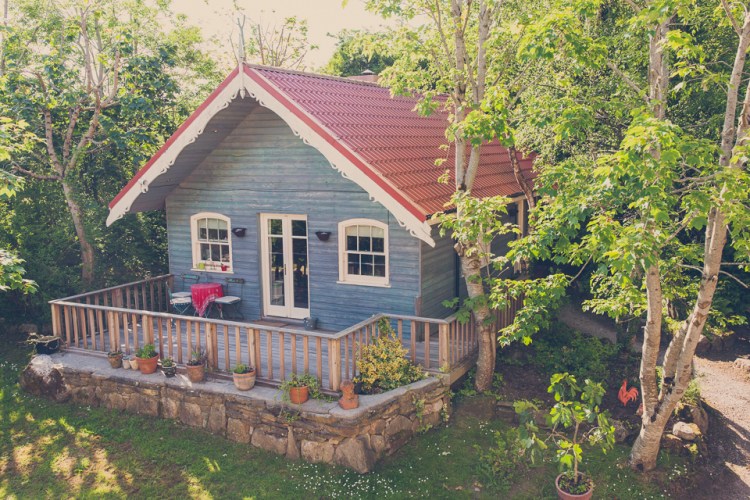
Slieve Aughty Centre in Loughrea, Galway, is an eco-friendly equestrian and activity leisure centre set on 17 acres, some of which is a Special Protection Area for the hen harrier. The centre runs on renewable energy and supplementary heating in the eco-lodge is with wood harvested on site. The centre is designed to maximise daylight and reduce the need for artificial lighting. Laundry is mostly air dried and lighting and low flow shower heads, sink taps and toilets are installed in the common areas. Rainwater is collected for use in the stables and garden and hot discharge water from the dishwasher is sometimes used to clean floors or outside decking. Vegetables and fruits are grown chemical-free on site with additional additional fruits and vegetables sourced locally and organically, when possible. Cheese and free-range eggs are provided by local farms and mushrooms are harvested from the forest when available. More than 90% of purchased products are certified organic and coffee and tea purchased are fair trade. They compost any food waste and they reduce packaging by buying in bulk. In 2007 chalets were constructed with old timber, roof and brick from our old guest house. Dining room furniture was made with timber from the old guest house as well and in 2010, 2 sheds were renovated completely with materials from the original guest house. Guests who choose non-air travel receive a 5% discount on their holiday and farm bikes are provided free for guests to visit the immediate area. Eco-friendly cleaners are used for all cleaning and clothes washing and cloths are used for cleaning instead of paper towels. The centre supports the Irish Peatlands Conservation Council, places bird houses and plants native trees around the centre and has developed a free nature walk for the public at it’s own expense.
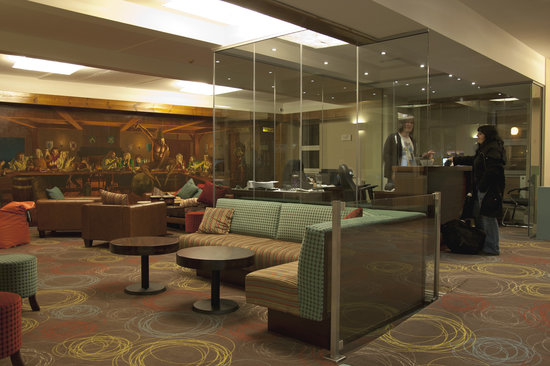
Kinlay Hostel in Galway is fitted out with LEDs, which reduced their electricity usage by 23%. They have a free water refill station, which since it’s installation has saved over 20,000 plastic bottles. Their breakfast is free of single-use plastic and they use fairtrade carbon neutral coffee. They do offer compostable coffee cups and a compost bin, but encourage guests to use reusable cups when siting in. All of their shower heads are aerated, which has reduced their water usage by 25%. They also operate a keyless mobile check-in system, cutting down significantly on the use of plastic keycards and paper security passes.

Aran Island Camping and Glamping off the Coast of co Galway, use solar panels to provide hot water and energy for glamping units and they handle laundry on site, saving on cargo use and unnecessary transport. They use electric vehicles on our site for daily operations and delivery of goods and services and all their staff use bicycles for commuting to and from work. Low energy bulbs are used with motion sensors and timers to reduce energy consumption, and light pollution, and the shower block is powered by solar panels. The majority of furniture and fixtures on site have been upcycled and repurposed, and they minimise paper usage by using online registration and communications and have a digital online guest directory instead of printed information. They work with local companies and buy local where possible. Their cleaning products are environmentally friendly and have started planting on site in order to support biodiversity.
Kerry
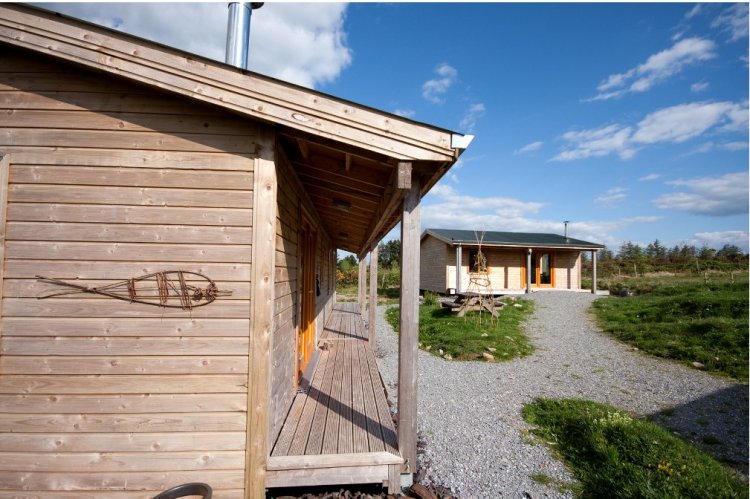
Gortbrack Organic Farm offers 3 timber cabins on a 9 acre site with a diverse ecological & native Irish habitats, overlooking Tralee Valley, Co. Kerry. The cabins run off solar panels, have wood burning stoves and are said to be very well insulated. Each cabin has wi-fi, a fitted kitchen, a wet shower / bathroom, oak and tile floors throughout. There is a laundry room beside the cabins with a washing machine and dryer.
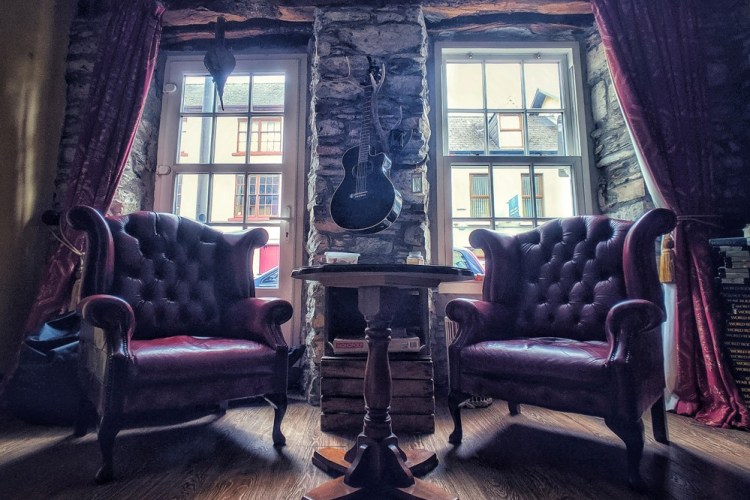
The Black Sheep Hostel in Killarney uses electricity from renewable sources, has a 30 foot polytunnel where they grow their own vegetables and herbs, keep chickens that are mainly fed on food waste from the hostel kitchen, have an organic composting system that supplies their garden, upcycle furniture for their building, plant trees in a local rewilding project, offer a keep-cup discount in their coffee shack, give a free drink to guest that arrive on bicycle, use fair trade coffee, and buy approximately 70% of goods locally. They are also striving to be carbon negative in the next 2 years.

The Ross Hotel in Killarney has eliminated almost all single-use plastic, offer water refills for guests, provide recycling bins in guest rooms, partner with a company to recycle used bars of soap and toiletries, use green energy & BioLPG, use eco cleaning products, have two EV charge points, offer complimentary access to PressReader to avoid physical magazines & newspapers, use LED lighting throughout, are members of a local community groups.
And if your near Castlegregory check out Spillane’s Bar, which works to minimise waste and energy usage as much as possible.
Kilkenny

Croan Cottages is a set of well-insulated cottages on a small holding in Kilkenny, which run on renewable energy and use low-energy sensor-controlled lighting set in a chemical-free garden of native pollinator friendly plants fed with homemade compost and harvested rainwater. The owners use eco-friendly cleaning products and prioritise the purchase of local organic, fairtrade and GMfree food.

Riverhollow Wild Camping in Kilkenny allows you to camp in the Riverhollow Nature Reserve. The approach is to leave nothing but footprints and campers are expected to bring their own rubbish home.
Meath

Rock Farm Slane Glamping is a billed as a luxury eco campsite based on an organic farm and ecotourism project on the Slane Castle estate, Co Meath. The campsite is situated in a secret grove of parkland trees overlooking meadows and the demesne woodlands on the North bank of the River Boyne. The parkland surrounding the boutique campsite is a designated Natural Heritage Area and Special Area of Conservation and includes an interesting bird population (herons, cormorants, egrets) and a thriving population of Irish hares. On the farm itself, they harvest their own rainwater and process their waste water through natural systems which feed into a landscaped wetland. Some of the accommodation have composting toilets.
Tipperary
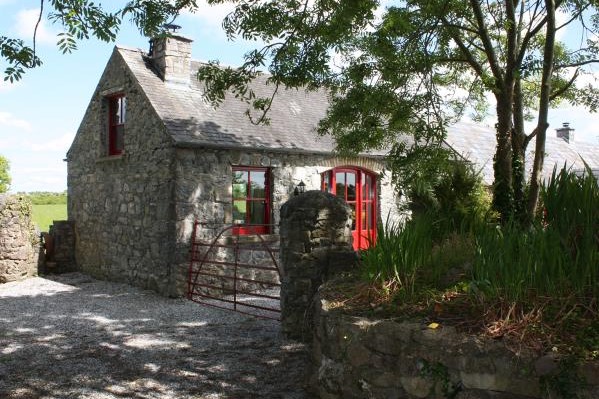
Terryglass cottages in Tipperary help a family earn enough income to continue to work their third-generation family farm. They state that all labour and inputs are sourced locally as much as possible and that in 2016 they won a Gold Medal at the Irish Responsible Travel Awards for local sourcing. They state that the cottages have been painted with non-toxic paints and water based varnishes and restored with recycled materials. The owners also meter electricity used by guests, thereby rewarding low-energy consumers.
Waterford

Nire Valley Ecocamping based in Ballymacarbry, Co Waterford .Their cabins are built using locally felled and processed timber that doesn’t need chemical treatments. They’re also powered by solar panels, and designed to take advantage of passive solar heating. Rainwater is harvested and a series of constructed wetlands treats their waste water. The owners of the camp operate so as to limit disturbance of the natural landscape on their land to protect biodiversity, such as cutting grass late in the season and retaining their extensive native hedgerows. Supplies and services are sourced locally. You are asked not to bring anti-bacterial soap when visiting as it can harm creatures living in the wetland.
Wicklow
Brooklodge & McCreddin Village uses geo-thermal energy, and gas derived from food waste to heat and cool their properties. They run a certified organic restaurant on site, and work with local suppliers to minimise all packaging. They provide recycled toilet paper and organic products in their spa.
Green Adventure EcoHostel is based on an organic farm close to forests in Co Wicklow. They also offer a series of land and water based team building events on site.

Preserving what is existing is a large component of sustainable living, which is why I’m including properties run by the non-profit Irish Landmark Trust in this list. They give new life to interesting and unusual properties that are in need of conservation by turning them into unique self-catering holiday accommodation. Their properties range from lighthouses and schoolhouses, to castles and gate lodges.

Slow Cabins are a series of off-grid cabins located on 5 sites around Ireland’s countryside. They run on solar energy, employ rainwater harvesting and have a dry toilet. They plant a tree for every booking and say they invest in nature conservation initiatives. Interestingly you aren’t told the location of the cabin until 2 weeks before you arrive!
Sustainable Accommodation in the UK

Tory Bush Cottages in Newcastle, Northern Ireland are highly insulated buildings designed to maximise passive heating from the sun. They contain an efficient gas boiler that only heats water as needed, reducing water and energy waste. Gas metres record consumption, which is billed to guests. This has helped to reduce overall consumption. More recently built spaces were created with timber frame and wall-board made from compressed newspaper, insulated with sheeps wool. These buildings are heated with solar panels, ventilated with a heat exchange system and heated with a wood pellet system. They also feature a rainwater harvesting system. The venue is able to generate 90% of it’s electricity needs with the rest being bought from a renewable energy provider.

The Salthouse in Antrim is the epitome of sustainable luxury. The generate enough energy to power 150 homes annually with their wind turbine and solar panels. They heat their water with air source heat pumps and use smart individual controls to minimise energy & heating consumption. They allow guest to recharge their EV’s from their renewable energy systems. They’ve also banned single-use plastics

The Shepherds Hut is located in three acres of flower meadows and orchards on the Welsh border with stunning (according to the website) views across the valley. The main focus of this location is the proximity to nature with red kites and buzzards in the skies, clear starry nights, hooting tawny owls, roaming badgers, and in summer dragon flies scooting over the pond and a wildflower meadows. It comes with a double mattress with inflatables for up to 2 children, a fully equipped kitchen with gas hob, grill and fridge and an outdoor fire pit. Running water, a flushing toilet and a gas powered shower is provided too and electricity is generated via solar panels. The property also offers a 3 bed cottage onsite, which can sleep up to 7 people.

Old-Lands is a stunning old family estate in Monmouthshire, Wales run on green principles by a long line of ecologists and naturalists who installed solar water-heating in the 70’s, planted a walled garden to keep the household self-sufficient in vegetables and fruit, kept bees to pollinate the orchard and make honey, and had chickens to recycle leftovers and lay eggs. Some of the estate has been taken on by the Gwent Wildlife Trust and is being managed so that it reverts to flower-rich meadow. They offer forest school sessions for children, nature walks and you can order homemade food during your stay or buy chemical free produce grown in the walled garden.
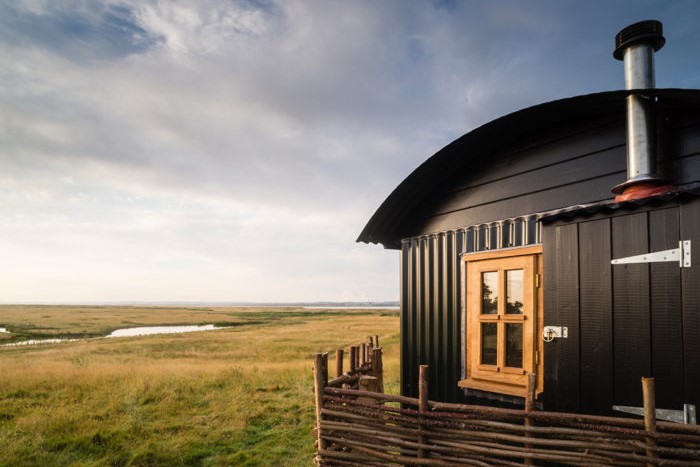
Elmley is a family-run farm set in the middle of the 3,200 acre estate in Kent that is also a SSSI, Special Protected Area for birds and Ramsar site (wetland of world importance). The owners of the farm, Philip and Corinne Merricks, have farmed on the grazing marsh for over 40 years and have the unique status of being the only family farmers who own and manage a National Nature Reserve. The farm is off-grid and is powered by a very efficient solar array and generator with big batteries. The huts are handcrafted using natural materials and eco-friendly insulation and fod is locally sourced.
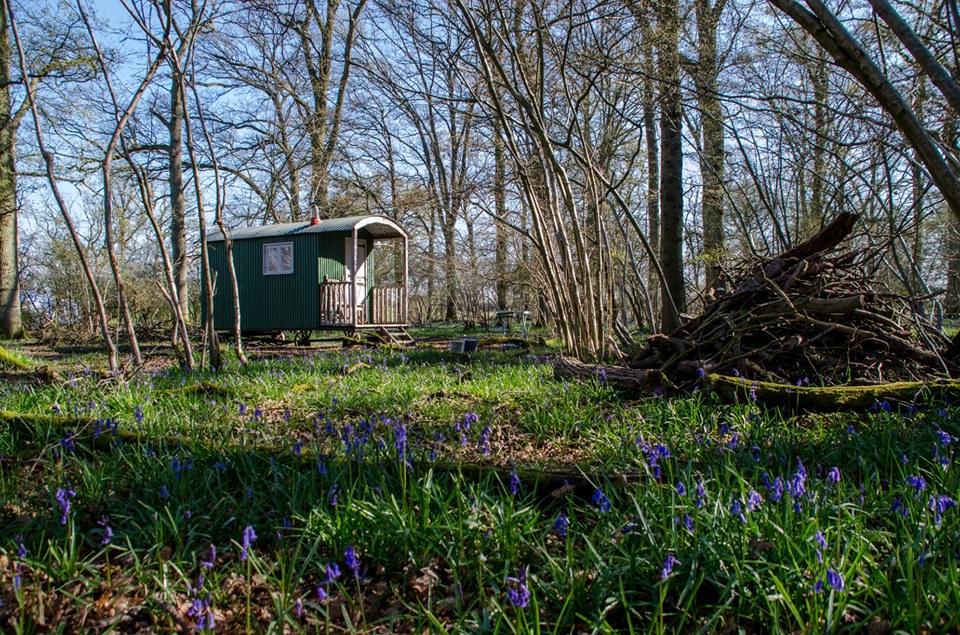
Knepp is a 3,500 acre estate just south of Horsham, West Sussex. Since 2001, the land has been devoted to a pioneering rewilding project with extremely rare species like turtle doves, nightingales, peregrine falcons and purple emperor butterflies now breeding there. You can stay on the estate in yurts, bell tents, shepherd’s huts, treehouses or with your own tent. Their accommodation is furnished with upcycled pieces and materials and their treehouses are made from local, sustainably sourced oak, chestnut and Douglas fir. All accommodation options have natural fibre mattress, feather duvet and four down pillows, pure cotton bed-linen, and recycled wool blankets. There are two eco-friendly flushing loos and three hot water rain-showers on the campsite site, as well as two hot water open air baths. Campers are also allowed to use the luxury mains showers and flushing loos near the other accommodation. The campsite provides solar lighting, solar charging station for laptops and mobiles and guests can buy local, sustainable charcoal, firewood, kindling, eco-firelighters, long matches and log candles, organic wine, beer and cider, and the estates own Wild Range longhorn and venison sausages, steaks and burgers.
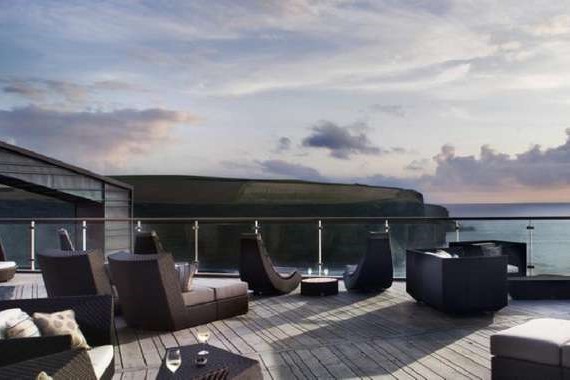
The Scarlet Hotel in Cornwall, England claim to source responsibly, reduce the amount of waste they send to landfill, create rather than consume. They also monitor their energy usage and aim to reduce their carbon footprint year-on-year.
If you’re heading to a beach in Cornwall then check out Timewarp Bellyboards who rent out bellyboards, saving you from having to buy them.

Log House Holiday in the Cotswold, England set in a forest landscape, which was planted by the owners, and includes wild flowers and reed beds. Their log houses are constructed from sustainable Finnish woodlands and are designed to be cosy in the winter and cool in the summer. All of their holiday cabins have ground source heat pumps which extract heat from the lake, supplying all of the hot water, underfloor heating and the traditional Finnish hot tubs. In 2011, they installed a large solar tracking system which sits hidden in one of the large reed beds; this provides nearly all of the electricity that is used on site. Sustainable firewood for the wood burners in each cabin is harvested on-site from their coppiced tree plantations and water in all of the cabins comes from their on-site spring. There’s even an Organic Farm Shop nearby so you can get locally sourced organic food.
Another option for a property amongst nature would be to check out the England page on Nature House.
Quirky Campers (see top photo) are a collective of camper van owners based across the UK offering an opportunity for holidaymakers to experience their campervan digs, many of which are decked-out with natural and reclaimed materials, come stocked with eco-friendly cleaning products and some even have solar panels and run on biodiesel. They have vans available to hire and pick-up in Bristol, Cornwall, Devon, London, Wales, West Midlands, Somerset and Liverpool. The family-run business also donate 10% of their profits to charity. (Extract from Life and Soul Magazine)

The Dome Garden in the UK is a purpose built glamping village with 11 insulated geodesic domes, just North of Bristol, in the spectacular Forest of Dean. Each dome has an en-suites with flushing loos & wood fired showers or baths, proper beds, luxury linen & wood burning stoves.
And if you’re going to Bristol here’s a guide to the green side of Bristol.

Eco Escape Campsite in Pembrokeshire is a family owned, dog-friendly spot. They try and keep their carbon footprint as low as possible by using solar panels and wind turbines, upcycling as much as they can including upcycled firepits which are fueled with sustainable firewood. They’ve also fitted bat and bird boxes in their trees, and plant a tree for every family that stays with them.

Cerenety Eco Campsite in Cornwall uses solar panels to hear their showers and has composting toilets based on the Lovable Loo design. They also have a reed bed as a filtration system for waste water. The cafe that they run during busy periods is run on wood burning power and they make breakfast crepes from eggs laid by their own chickens. Guests are invited to forage their veg patch in return for a donation and items made from recycled materials are available to buy onsite.

Loveland Farm in Devon has a campsite that runs on a recycled wood chip 110kw biomass system and 5kw solar panels. All of their pods have composting toilets which require no water, electricity or drainage. They grow most of their own vegetables, which they supplement with suppies from local farmers and small holders. They also help curate a local farmers market and take part in local seed swaps too.

Wheatland Farm is an ongoing conservation project of the Popehouse Moor Site of Special Scientific Interest by a family in Devon. To date they’ve planted trees, managed natural hedgerows, meadows lands and a large pond, installed nest boxes for bats and birds. Their eco lodges all have solar hot water and run on 100% renewable energy, most of it generated on site from their 11kW wind turbine and solar PV panels. One of their lodges was built using straw bales from three fields away, lime plaster made in Devon, local wood cladding, and a host of recycled materials.

The Sekforde is a pub with 2 bed flat in London that uses a combination of ground source heat pumps and a heat recovery system to heat their restored 1820’s building. These systems provide both heating and cooling for the pub and its accommodation, the kitchens and the beer store, reducing the pub’s energy use to just 15% of what a similar pub building would normally use. The pub is also highly focused on reducing food waste and eliminating plastic. It also runs as a social enterprise, with profits of the pub go to the Sekforde House Trust, which gives scholarship grants to students with high academic achievement and who want to change the world. (Source: Earthbound Report)
If you’re looking for the most sustainable way to get around London check out the passenger and cargo service Pedal Me, and here is a list of zero waste stores in the city of London
And while in the UK be sure to put some of their nature reserves and visitor centres
Scotland

Knoydart runs on a privately owned hydro scheme and solar photovoltaic panels, and is heated using a thermal heat pump and wood burning stove fed with locally sourced sustainable wood fuel from the Knoydart Forest Trust. The buildings were constructed using larch cladding, environmentally sensitive high-grade insulation, half-flush loos, energy efficiency appliances and light fittings.
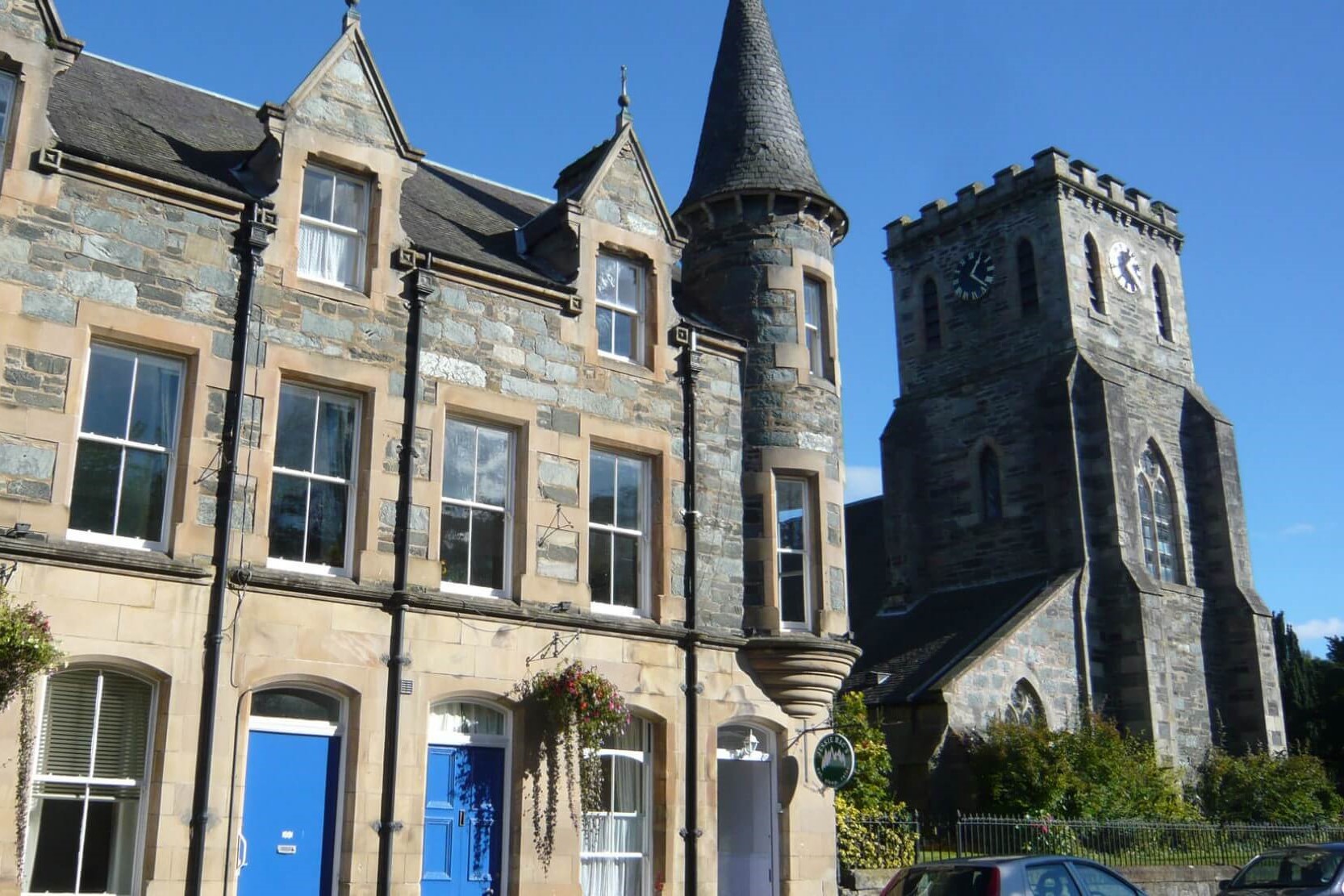
Jessie Mac’s in Scotland aims to be the greenest small hostel in Scotland. The owners employ local staff, contractors and suppliers wherever possible and pay a living wage to their employees. They also sponsor the local highland games, donate free bed nights to local charities and work really hard to buy everything locally. They have halved the amount of energy that they use per guest and recycle 90% of our/your waste. They are also a Fairtrade business, buying only fairly traded tea, coffee, sugar and bananas for breakfasts and rooms. The owners won a Gold level in the Green Tourism Business Scheme.

Saorsa 1875 is a 100% vegan, dog-friendly hotel set in 2 acres of woodlands on the edge of a town in Perthshire, Scotland that’s been listed as one of the Sunday Times’ top 100 hotels. They serve local, seasonal plant based food in their restaurant.
Dundreggan rewilding centre has accommodation onsite now.
Aldourie Castle, a stunning castle available for exclusive hire, is undertaking a restoration of the landscape surrounding the venue.

Dene Cottage on Orkney sits in 6 acre field which is reserved for wildlife and is not cultivated. The cottage runs on 100% renewable energy and has been refurbished to be as energy efficient as possible. Cleaning is all done with eco-friendly products and reusable items are provided to help guest avoid single-use plastic. Electric bike hire is available locally and the nearest village stocks lots of locally produced food and products.

On her most recent article about a low waste holiday in Phuket by Gippsland Unwrapped, an Australian zero waste blogger, mentioned that the Accor Hotel group has a Planet 21 Programme, focused on local sourcing, diversity and water, energy and waste management. Tammy’s article also mentions the Green Hotelier where you can read a summary of the Planet 21 Programme. It’s also a great resource for information on sustainable ethical destinations.
If you’re eating out the chain of Pig restaurants only serve seasonal food sourced within a 25km radius of each venue.
Other Resources for Sustainable Accommodation Abroad
If none of these properties float your boat I have listed some websites to search for alternatives on my article Sustainable (ish) Ethical Travelling
You can also find some organic farms with accommodation in the UK on the Organic Soil Association’s website.
And above all enjoy your trip.
Elaine & Paul

